| Listing 1 - 10 of 23 | << page >> |
Sort by
|
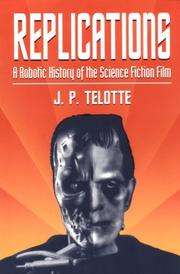
ISBN: 0252064666 Year: 1995 Publisher: Champaign, IL : University of Illinois Press,
Abstract | Keywords | Export | Availability | Bookmark
 Loading...
Loading...Choose an application
- Reference Manager
- EndNote
- RefWorks (Direct export to RefWorks)
Robots dans le cinéma --- Robots in film --- Robots in motion pictures --- Robots in motion pictures. --- Science fiction films --- History and criticism. --- History and criticism
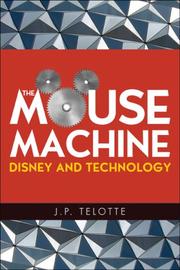
ISBN: 9780252033278 0252033272 9780252075407 0252075404 9786613895660 0252092635 1283583216 9780252092633 9781283583213 6613895660 Year: 2008 Publisher: Urbana
Abstract | Keywords | Export | Availability | Bookmark
 Loading...
Loading...Choose an application
- Reference Manager
- EndNote
- RefWorks (Direct export to RefWorks)
Throughout Disney's phenomenally successful run in the entertainment industry, the company has negotiated the use of cutting-edge film and media technologies that, J. P. Telotte argues, have proven fundamental to the company's identity. Disney's technological developments include the use of stereophonic surround sound for Fantasia, experimentation with wide-screen technology, inaugural adoption of three-strip Technicolor film, and early efforts at fostering depth in the animated image.Telotte also chronicles Disney's partnership with television, development of the theme park, and depiction of technology in science fiction narratives. An in-depth discussion of Disney's shift into digital filmmaking with its Pixar partnership and an emphasis on digital special effects in live-action films, such as the "Pirates of the Caribbean" series, also highlight the studio's historical investment in technology. By exploring the technological context for Disney creations throughout its history, "The Mouse Machine" illuminates Disney's extraordinary growth into one of the largest and most influential media and entertainment companies in the world.
Amusement parks --- Motion picture industry --- Television --- Technological innovations. --- Walt Disney Company. --- Funparks --- Theme parks --- Film industry (Motion pictures) --- Moving-picture industry --- Disney Studio --- 迪斯尼公司 --- Mei guo di shi ni gong si --- 美國迪士尼公司 --- Amusements --- Parks --- Amusement rides --- Cultural industries --- Walt Disney Productions --- Technological innovations --- E-books --- 21st Century Fox (Firm) --- Industrie du cinéma --- Télévision --- Parcs d'attractions --- Innovation.
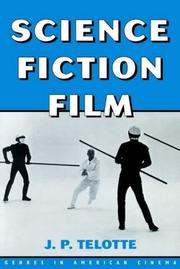
ISBN: 0521593727 0521596475 9780521593724 9780521596473 0511034954 9780511034954 9780511039928 0511039921 9780511613159 0511613156 0511155468 9780511155468 0511050194 9780511050190 1283331462 9781283331463 1107114519 9781107114517 9786613331465 6613331465 1139134027 9781139134026 1139130218 9781139130219 Year: 2001 Publisher: Cambridge Cambridge University Press
Abstract | Keywords | Export | Availability | Bookmark
 Loading...
Loading...Choose an application
- Reference Manager
- EndNote
- RefWorks (Direct export to RefWorks)
Science Fiction Film examines one of the most enduring and popular genres of Hollywood cinema, suggesting how the science fiction film reflects attitudes toward science, technology, and reason as they have evolved in American culture over the course of the twentieth century. J. P. Telotte provides a survey of science fiction film criticism, emphasizing humanist, psychological, ideological, feminist, and postmodern critiques. He also sketches a history of the genre, from its earliest literary manifestations to the present, while touching on and comparing it to pulp fiction, early television science fiction, and Japanese animé. Telotte offers in-depth readings of three key films: Robocop, Close Encounters of the Third Kind, and THX 1138, each of which typifies a particular form of science fiction fantasy. Challenging the boundaries usually seen between high and low culture, literature and film, Science Fiction Film reasserts the central role of fantasy in popular films, even those concerned with reason, science, and technology.
Film --- United States --- Science fiction films --- Films de science-fiction --- History and criticism. --- Histoire et critique --- United States of America
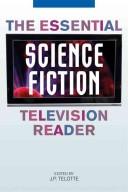
ISBN: 0813138736 1283233274 9786613233271 0813172969 9780813172965 9780813124926 0813124921 Year: 2008 Publisher: Lexington University Press of Kentucky
Abstract | Keywords | Export | Availability | Bookmark
 Loading...
Loading...Choose an application
- Reference Manager
- EndNote
- RefWorks (Direct export to RefWorks)
Exploring early hits such as The Twilight Zone and Star Trek, as well as more recent successes such as Battlestar Galactica and Lost, The Essential Science Fiction Television Reader illuminates the history, narrative approaches, and themes of the genre. The book discusses science fiction television from its early years when shows attempted to recreate the allure of science fiction cinema, to its current status as a sophisticated genre with a popularity all its own. J. P. Telotte has assembled a wideranging volume rich in theoretical scholarship yet fully accessible to science fiction fans.
Book
ISBN: 0292711441 Year: 1991 Publisher: Austin University of Texas Press
Abstract | Keywords | Export | Availability | Bookmark
 Loading...
Loading...Choose an application
- Reference Manager
- EndNote
- RefWorks (Direct export to RefWorks)
Book
ISBN: 9780415825825 9780415825818 9780203538777 Year: 2014 Publisher: New York, N.Y. Routledge
Abstract | Keywords | Export | Availability | Bookmark
 Loading...
Loading...Choose an application
- Reference Manager
- EndNote
- RefWorks (Direct export to RefWorks)
Book
ISBN: 0814337635 Year: 2004 Publisher: Detroit : Wayne State University Press,
Abstract | Keywords | Export | Availability | Bookmark
 Loading...
Loading...Choose an application
- Reference Manager
- EndNote
- RefWorks (Direct export to RefWorks)
A historical account of the context, impact, and legacy of one of the most successful series in American television history.
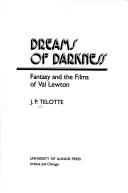
ISBN: 0252011546 9780252011542 Year: 1985 Publisher: Urbana University of Illinois Press
Abstract | Keywords | Export | Availability | Bookmark
 Loading...
Loading...Choose an application
- Reference Manager
- EndNote
- RefWorks (Direct export to RefWorks)
Book
ISBN: 0819563463 Year: 1999 Publisher: Hanover Wesleyan University Press / University Press of New England
Abstract | Keywords | Export | Availability | Bookmark
 Loading...
Loading...Choose an application
- Reference Manager
- EndNote
- RefWorks (Direct export to RefWorks)
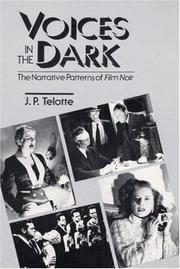
ISBN: 0252060563 Year: 1989 Publisher: Champaign, IL : University of Illinois Press,
Abstract | Keywords | Export | Availability | Bookmark
 Loading...
Loading...Choose an application
- Reference Manager
- EndNote
- RefWorks (Direct export to RefWorks)
| Listing 1 - 10 of 23 | << page >> |
Sort by
|

 Search
Search Feedback
Feedback About UniCat
About UniCat  Help
Help News
News